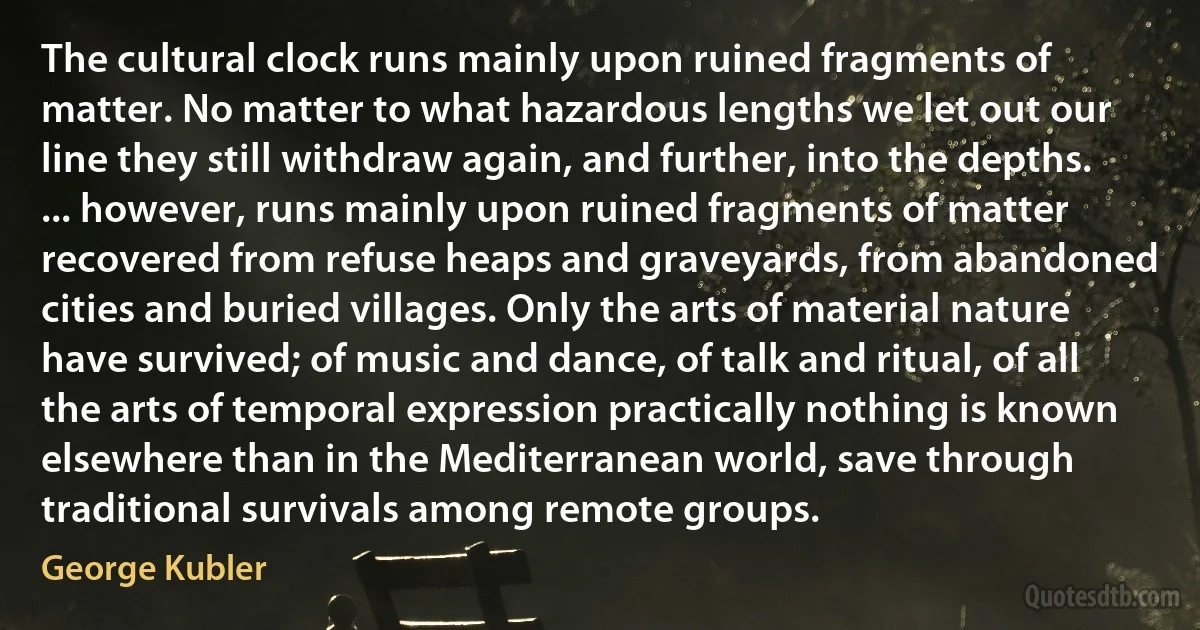Remote Quotes - page 7
There is the name and the thing: the name is a voice which denotes and signifies the thing; the name is no part of the thing, nor of the substance; 'tis a foreign piece joined to the thing, and outside it. God, who is all fulness in Himself and the height of all perfection, cannot augment or add anything to Himself within; but His name may be augmented and increased by the blessing and praise we attribute to His exterior works: which praise, seeing we cannot incorporate it in Him, forasmuch as He can have no accession of good, we attribute to His name, which is the part out of Him that is nearest to us. Thus is it that to God alone glory and honour appertain; and there is nothing so remote from reason as that we should go in quest of it for ourselves; for, being indigent and necessitous within, our essence being imperfect, and having continual need of amelioration, 'tis to that we ought to employ all our endeavour.

Michel de Montaigne
Since we cannot completely eliminate existential risk - at any moment, we might be tossed into the dustbin of cosmic history by the advancing front of a vacuum phase transition triggered in some remote galaxy a billion years ago - the use of maximin in the present context would entail choosing the action that has the greatest benefit under the assumption of impending extinction. Maximin thus implies that we ought all to start partying as if there were no tomorrow. That implication, while perhaps tempting, is implausible.

Nick Bostrom
In a general way, we can represent the present value of a future good as a function of the time separating the present from this future. In the classical conception, an exponential future discount is stipulated, which implies that the curves corresponding to two distinct future goods, one small and immediate, the other large and more remote, never intersect. According to more recent research, however, it seems that this discount typically takes a hyperbolic form.

Jon Elster
We must be careful to discriminate between our own incapacity to test truth and the necessary improbability of an event. It is plain that from our ignorance of the remote spheres of God's action we cannot judge of His works removed from our experience; but a fact is not necessarily doubtful because it cannot be reached by our ordinary senses. To recapitulate, we may lay down the following propositions:
1. That there is no real physical distinction between miracles and any other operations of the Divine energy : that we regard them differently is because we are familiar with one order of events and not the other.
2. There is nothing incredible in a miracle, and the credibility of a miraculous event is to be measured only by the evidence which sustains it. And although the extraordinary character of a phenomenon may render the event itself improbable, it does not, therefore, necessarily render it either incredible or untrue.

Charles Babbage
Is the success of the Catholic Church a marvel? If this church is of divine origin, if it has been under the especial care, protection and guidance of an Infinite Being, is not its failure far more wonderful than its success? For eighteen centuries it has persecuted and preached, and the salvation of the world is still remote. This is the result, and it may be asked whether it is worth while to try to convert the world to Catholicism.

Robert G. Ingersoll
Like the atom bomb, it arose out of equally academic research. Never, gentlemen, underestimate science. I doubt if there is a single field of study so theoretical, so remote from what is laughingly called everyday life, that it may not one day produce something that will shake the world.

Arthur C. Clarke
There are no buildings that have been built by chance, remote from the human society where they have grown and its needs, hopes and understandings, even as there are no arbitrary lines and motiveless forms in the work of the masons. The life and existence of every great, beautiful and useful building, as well as its relation to the place where it has been built, often bears within itself complex and mysterious drama and history.

Ivo Andrić
[Boulding grasps the significance of sociobiology's emphasis on biogenetics] that there are biogenetic factors in learning capacity and potential can hardly be denied... [yet] biogenetically imposed limits to human learning... seem to be much more remote... than are the limitations imposed by the biogenetic structure.

Kenneth Boulding
It had been the winter of 1835-6 that the ship, Alert, in her voyage for hides on the remote and almost unknown coast of California, floated into the vast solitude of the bay of San Francisco. All around was the stillness of nature. One vessel, a Russian, lay at anchor there, but during our whole stay not a sail came or went. Our trade was with remote missions, which sent hides to us in launches manned by their Indians... Over a region far beyond our sight there was no other human habitations, expect that an enterprising Yankee, years in advance of his time, had put up, on the rising ground above the landing, a shanty of rough boards, where he carried on a very small retail trade between the hide ships and the Indians. On the evening of Saturday, the thirteenth of August, 1859 (I again sailed into) the entrance to San Francisco, (now) the great center of worldwide commerce.

Richard Henry Dana, Jr.
It had been the consistent belief of the Christian world, down to the period now under consideration, that the origin of this planet was not more remote than a few thousand years; and that since the creation the deluge was the only great catastrophe by which considerable change had been wrought on the earth's surface. On the other hand, the opinion was scarcely less general, that the final dissolution of our system was an event to be looked for at no distant period.

Charles Lyell
We know that the Egyptian priests were aware, not only that the soil beneath the plains of the Nile, but that also the hills bounding the great valley, contained marine shells; and it could hardly have escaped the observation of Eastern philosophers, that some soils were filled with fossil remains, since so many national works were executed on a magnificent scale by oriental monarchs in very remote eras.

Charles Lyell
The form of a coast, the configuration of the interior of a country, the existence and extent of lakes, valleys, and mountains, can often be traced to the former prevalence of earthquakes and volcanoes in regions which have long been undisturbed. To these remote convulsions the present fertility of some districts the sterile character of others, the elevation of land above the sea, the climate, and various peculiarities, may be distinctly referred.

Charles Lyell
We learn from Plutarch, that this was the theme of one of the hymns of Orpheus, so celebrated in the fabulous ages of Greece. It was brought by him from the banks of the Nile; and we even find in his verses, as in the Indian systems, a definite period assigned for the duration of each successive world. The returns of great catastrophes were determined by the period of the Annus Magnus, or great year, a cycle composed of the revolutions of the sun, moon, and planets, and terminating when these return together to the same sign whence they were supposed at some remote epoch to have set out. The duration of this great cycle was variously estimated. According to Orpheus, it was 120,000 years; according to others, 300,000 and by Cassander it was taken to be 300,000 years.

Charles Lyell



